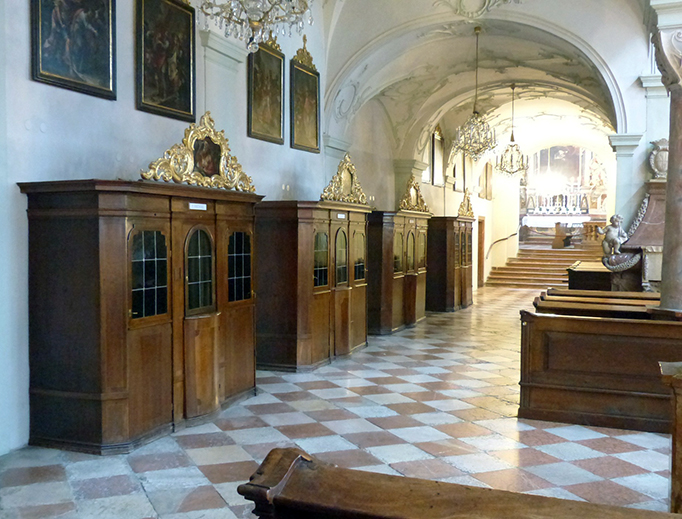Does the Seal of Confession Help Criminals?
The answer is no, and here’s why.

In the news recently: A laicized priest who murdered one of his penitents back in 1960 has been convicted and sentenced to life in prison. The case finally came to trial after a second now-laicized priest, who had heard the murderer’s confession, came forward in 2002 with the information he received in a confession back in 1963.
Cases like this cause people to question whether priests should, in fact, always keep confessions secret. Would justice be better served by allowing, or even requiring, that priests divulge the contents of certain confessions?
The answer is no, and if we look closely at the details of this case, we can see why.
The Legal System Has Tools of Its Own
There was evidence in the murder case of Irene Garza pointing to Fr. Feit as her murderer:
- Fr. Feit was the last person to see her alive. By his own admission, she was last seen at his parish church, coming to him for confession.
- Her shoe was found near the curb of the church.
- One of his possessions was found in the canal where her body was found.
- Another priest noticed that Fr. Feit had (unusual) scratches on his hand in the time after Miss Garza disappeared.
Should a priest be above suspicion in a murder case? Not this priest. Just weeks before Miss Garza was murdered, another woman reported that a man had attacked her at the communion rail of another parish in the vicinity and attempted to put a rag in her mouth. In the line-up of suspects, the assaulted woman identified Fr. Feit as her attacker.
So why wasn’t the case pursued? It wasn’t because the justice system lacked a sacramental confession. Police don’t routinely require priest-reports in order to prosecute a criminal. It was because the local authorities decided to let Fr. Feit off the hook.
In Feit’s trial, prosecutors presented evidence that elected law enforcement officials and church officers suspected that Feit killed Garza, the Associated Press reported. But prosecutors allege the district attorney and church leaders cut a deal to stop the investigation, to protect the reputation of the church.
Most elected officials at the time in Hidalgo County were Catholic, according to the AP, and then-Sen. John F. Kennedy, a Catholic from Massachusetts, was running for president that year.
Thomas Doyle, 73, a Catholic priest and expert on sexual abuse and church law, read in court a letter recovered via subpoena of the Archdiocese of San Antonio and the Diocese of Corpus Christi, according to the McAllen newspaper the Monitor.
The letter, sent between clergy officials in October 1960, expressed concerns that if a priest was charged in Garza’s death, Kennedy’s presidential campaign and the re-election chances of the local Catholic sheriff would be at stake.
The Rev. Joseph Pawlicki, a pastor at a church outside Austin, wrote to the Rev. Lawrence Seidel, the head of the Oblates of Mary Immaculate order to which Feit belonged, insisting he hire a private investigator to find “loopholes” in Feit’s case, the Monitor reported.
It was not the sacramental seal that kept Fr. Feit from being prosecuted. It was the decision of those who had the responsibility to carry out justice to intentionally and knowingly fail in their duty to bring a criminal to trial.
What Happens Without the Seal of Confession?
What if Fr. Dale Tacheny, the priest who had heard Fr. Feit confess to his crime, had decided to immediately inform the police?
Would justice have been better served? What would have been the consequences of that act, and of a general lifting of the promise of secrecy in the sacrament of confession?
The police had already made the decision not to prosecute in the Garza murder case. There is no reason to believe they would have gone to trial based on additional evidence, since it appears they simply weren’t planning to prosecute Fr. Feit. They had already decided that rape and murder were not sufficiently serious crimes to be worth their efforts.
We can, however, ponder a more theoretical question: If priests were not bound to absolute confidence where the sacrament of confession were concerned, would there be more criminals brought to justice in general?
If we think through the implications of such a change, we can quickly see that would not be the case. If it were understood that our sacramental confessions were subject to public scrutiny, Catholics would simply stop going to confession. The supposed stream of evidence would dry up on the instant. Only those who had already been caught and convicted (whether in a court of law or the court of public opinion) would seek forgiveness. Who else would risk it?
Good Ends, Bad Means
It is good that Fr. Feit has been held responsible for his crimes, however belatedly. It is not good, however, that a priest violated the seal of the confessional. Even when our intentions are good, it is never acceptable to use immoral means to achieve our goals. We can be can be grateful that justice has been served, and be understanding of Fr. Tacheny’s desire for justice, without approving of the way he went about it.
Unfortunately, every time a priest breaks the seal of the confessional, it becomes that much harder for ordinary Catholics to trust that their priest will be faithful in not divulging what is spoken in absolute confidence. The good news is that we can have both justice and the seal of the confessional. The most effective tack for achieving these goals is to make full use of the ordinary means already at our disposal for preventing, investigating and prosecuting crimes.













